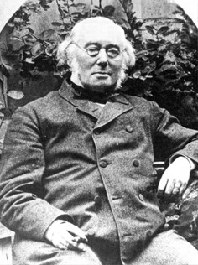
Reformed Christianity, also called Calvinism, is a major branch of Protestantism that began during the sixteenth-century Protestant Reformation, a schism in the Western Church. In the modern day, it is largely represented by the Continental Reformed, Presbyterian, and Congregational traditions, as well as parts of the Anglican and Baptist traditions.

A creed, also known as a confession of faith, a symbol, or a statement of faith, is a statement of the shared beliefs of a community which summarize its core tenets.

In Christianity, Christology is a branch of theology that concerns Jesus. Different denominations have different opinions on questions such as whether Jesus was human, divine, or both, and as a messiah what his role would be in the freeing of the Jewish people from foreign rulers or in the prophesied Kingdom of God, and in the salvation from what would otherwise be the consequences of sin.

Albrecht Benjamin Ritschl was a German Protestant theologian.
The Omega Point is a theorized future event in which the entirety of the universe spirals toward a final point of unification. The term was invented by the French Jesuit Catholic priest Pierre Teilhard de Chardin (1881–1955). Teilhard argued that the Omega Point resembles the Christian Logos, namely Christ, who draws all things into himself, who in the words of the Nicene Creed, is "God from God", "Light from Light", "True God from True God", and "through him all things were made". In the Book of Revelation, Christ describes himself three times as "the Alpha and the Omega, the beginning and the end". Several decades after Teilhard's death, the idea of the Omega Point was expanded upon in the writings of John David Garcia (1971), Paolo Soleri (1981), Frank Tipler (1994), and David Deutsch (1997).

Karl Barth was a Swiss Reformed theologian. Barth is best known for his commentary The Epistle to the Romans, his involvement in the Confessing Church, including his authorship of the Barmen Declaration, and especially his unfinished multi-volume theological summa the Church Dogmatics. Barth's influence expanded well beyond the academic realm to mainstream culture, leading him to be featured on the cover of Time on 20 April 1962.

In Christianity, Jesus is the Son of God as chronicled in the Bible's New Testament, and in most Christian denominations Jesus is held to be God the Son, a prosopon (Person) of the Trinity of God.
The following outline is provided as an overview of and topical guide to Christian theology:

Jürgen Moltmann was a German Reformed theologian who was a professor of systematic theology at the University of Tübingen and was known for his books such as the Theology of Hope, The Crucified God, God in Creation and other contributions to systematic theology. His works were translated into many languages.

Robert William Jenson was a leading American Lutheran and ecumenical theologian. Prior to his retirement in 2007, he spent seven years as the director of the Center for Theological Inquiry at Princeton Theological Seminary. He was the co-founder of the Center for Catholic and Evangelical Theology and is known for his two-volume Systematic Theology published between 1997 and 1999.

Pauline Christianity or Pauline theology, otherwise referred to as Gentile Christianity, is the theology and form of Christianity which developed from the beliefs and doctrines espoused by the Hellenistic-Jewish Apostle Paul through his writings and those New Testament writings traditionally attributed to him. Paul's beliefs were rooted in the earliest Jewish Christianity, but they deviated from this Jewish Christianity in their emphasis on inclusion of the Gentiles into God's New Covenant and in his rejection of circumcision as an unnecessary token of upholding the Mosaic Law.
Systematic theology, or systematics, is a discipline of Christian theology that formulates an orderly, rational, and coherent account of the doctrines of the Christian faith. It addresses issues such as what the Bible teaches about certain topics or what is true about God and his universe. It also builds on biblical disciplines, church history, as well as biblical and historical theology. Systematic theology shares its systematic tasks with other disciplines such as constructive theology, dogmatics, ethics, apologetics, and philosophy of religion.
In philosophy, theophysics is an approach to cosmology that attempts to reconcile physical cosmology and religious cosmology. It is related to physicotheology, the difference between them being that the aim of physicotheology is to derive theology from physics, whereas that of theophysics is to unify physics and theology.
Within Christianity, faith, in one sense, is often discussed in terms of believing God's promises, trusting in his faithfulness, and relying on God's character and faithfulness to act. Some denominations believe in the New Covenant and in the doctrine of salvation by faith alone. According to most Christian traditions and denominations, Christian faith requires a belief in the resurrection of Jesus, and the Agony in the Garden which Jesus states is the plan of God the Father.
Practice in Christianity is a work by 19th-century theologian Søren Kierkegaard. It was published on September 27, 1850, under the pseudonym Anti-Climacus, the author of The Sickness unto Death. Kierkegaard considered it to be his "most perfect and truest book". In it, the theologian fully exposes his conception of the religious individual, the necessity of imitating Christ in order to be a true Christian and the possibility of offense when faced with the paradox of the incarnation. Practice is usually considered, along with For Self-Examination and Judge for Yourselves!, as an explicit critique of the established order of Christendom and the need for Christianity to be (re-)introduced into Christendom, since a good part of it consists in criticism of religious thinkers of his time.
Roger Eugene Olson is an American Baptist theologian and Professor of Christian Theology of Ethics at Baylor University.

In Christianity, God, whose name is Jehovah or Yahweh, is the eternal, supreme being who created and preserves all things. Christians believe in a monotheistic conception of God, which is both transcendent and immanent. Christians believe in a singular Godhead that exists in a Trinity, which consists of three Persons: God the Father, God the Son, and God the Holy Spirit. Christian teachings on the transcendence, immanence, and involvement of God in the world and his love for humanity exclude the belief that God is of the same substance as the created universe but accept that God the Son assumed hypostatically united human nature, thus becoming man in a unique event known as "the Incarnation".
Secular theology is a term applied to theological positions influenced by humanism and secularism, rejecting supernatural metaphysical positions related to the nature of God. Secular theology can accommodate a belief in God, like many nature religions, but as residing in this world and not separately from it.
Carl Edward Braaten was an American Lutheran theologian and minister.
The theology of religions is the branch of theology and religious studies that attempts to theologically evaluate the phenomena of religions. Three important schools within Christian theology of religions are pluralism, inclusivism, and exclusivism, which describe the relation of other religious traditions to Christianity and attempt to answer questions about the nature of God and salvation.











